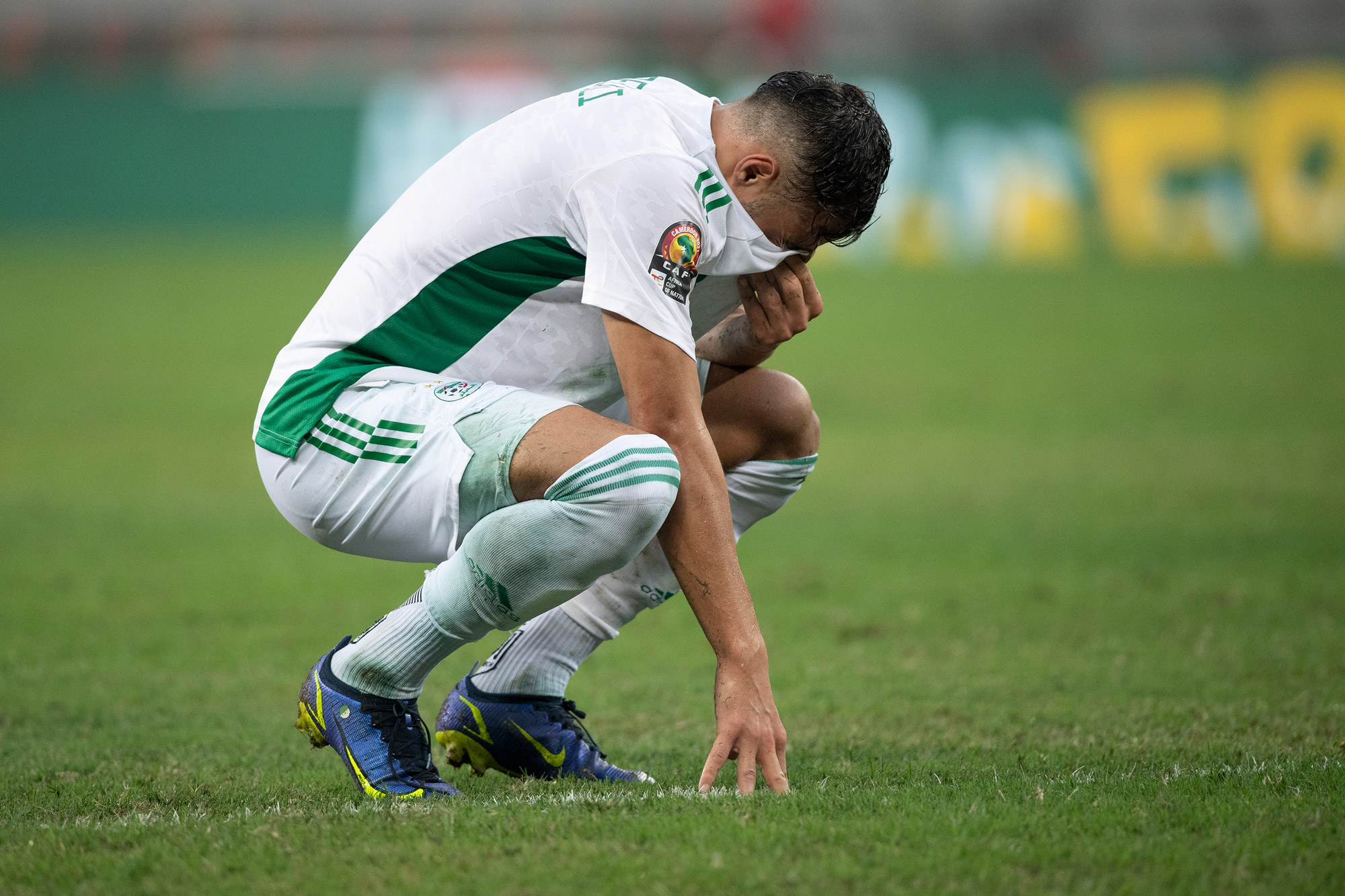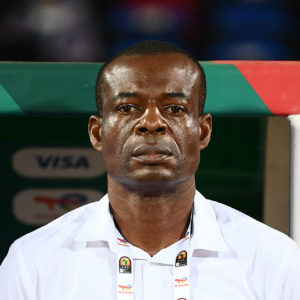Why Algeria imploded at the Afcon
The North African side had a disastrous showing in the tournament they entered as title holders and favourites. With the World Cup qualifiers on the horizon, can they rise from the ashes?
Author:
2 March 2022

If anyone ever doubted the power of a football match result, just show them Algeria’s 270 minutes in the 2021 Africa Cup of Nations (Afcon) that led to people completely second-guessing the success of The Fennecs.
Prior to the tournament, Algeria had a 35-match unbeaten run, easily disposing of Ghana in a pre-tournament friendly. They were justifiably dubbed favourites alongside hosts Cameroon as well as Morocco and Senegal, yet they were sent packing after just three group-stage matches. It is a serious blow considering that, in the new 24-team Afcon format, four of the best third-placed teams also qualify for the knockout stage.
The question on everyone’s minds since Algeria’s premature exit is what in the world happened to them? It is a valid question that many – even in the Algeria camp – are struggling to answer. Yet, after forensically analysing the happenings of the past two and a half years, it is clear that the seeds of their dreadful showing were sown almost immediately after their 2019 Afcon triumph.
Related article:
A few hours after Riyad Mahrez lifted the trophy, the players and staff hopped on a chartered jet to Algiers. Before they could even finish celebrating their historic victory with the people, it was clear that political interference at state level would force wholesale changes in the Algerian football federation.
Algeria’s heroes were paraded around the streets of Algiers on a double-decker bus whose last stop was the presidential palace. Curiously, observers noticed that the team photo with stand-in president Abdelkader Bensalah had a conspicuous absence, that of federation president Kheireddine Zetchi.
Sure enough, 18 months later Zetchi was ejected from his role for reasons that are still unknown. Charaf-Eddine Amara was brought in to replace him. Amara, a director of a local tobacco company, had little football experience compared to Zetchi, but he was seen as an innocuous unifier and amiable figurehead.
An exhausting job
Almost immediately palpable tension could be detected between the new head honcho and star coach Djamel Belmadi. As things stand, there are factions in the federation, which is basically split into those who work directly with Belmadi and others who were brought in by Amara.
The seemingly untenable arrangement is why most analysts in Algeria believe that Belmadi will not extend his contract after the 2022 World Cup. “The details of the contract will not be a problem for me in the future,” Belmadi said in a press conference in November. “What interests me is to know if I am still capable of contributing, if I have the strength, energy and conviction to continue progressing. The job is exhausting. In football there are cycles. Maybe the players will want to hear another discourse or work differently.”
Working conditions are the primary concerns of any coach worth their salt, and Algeria’s preparation for the Afcon in Cameroon was anything but ideal. In 2019, the team opted to hold their camp in Qatar. And that is about where the similarities end with their preparation this year.
Related article:
Two and a half years ago, the Algerians held a top-secret camp, barring media and supporters from training sessions. Even pre-tournament matches against Mali and Burundi were not televised. An anecdote later surfaced of Belmadi instructing the team bus driver to leave Mahrez at the hotel because he was a few minutes late for the call time. Algeria arrived in Egypt a full week prior to the tournament’s kickoff and immediately camped out in the best of facilities.
Two and a half years later, Algeria’s preparation was the polar opposite. The camp in Qatar was open to supporters and media, and captain Mahrez did not join the team, instead taking some personal time in the United Arab Emirates. To exacerbate matters, Algeria did not arrive in Cameroon until three days before the opening ceremony – not exactly auspicious timing when playing your first match at 2pm in the suffocating humidity of Douala.
The disorganisation of the delegation came to a head after Algeria’s embarrassing elimination. Just hours after their defeat to Ivory Coast, 18 players scrambled to the airport to return to their clubs. The following morning a video emerged on social media of Mahrez at Douala Airport’s Air France kiosk clearly struggling with details of his ticket.
When asked to comment on the fiasco at the airport, Belmadi seemed resigned: “I can only control what we do on the pitch. Everything else is not my prerogative.”
A team in disarray
On the pitch, Algeria were not much better. In Sierra Leone and Equatorial Guinea, Algeria had to face the two “weaker” opponents in group E first. Both sides set up in low blocs, countered well and relied on great goalkeeping performances to draw and beat the former champions.
A statistical analysis of the group stages paints a clear picture of what went wrong for Mahrez and company. Algeria’s two centrebacks led the Afcon in ball progression per passes during the group stages, indicating they were not facing heavy pressure. Aïssa Mandi passed the ball forward 503m and Abdelkader Bedrane 482m. Algeria also finished the group stages just second behind Senegal in terms of possession play with 59.2% of the ball, and only second behind Mali in the number of shots per game with 15.3.
A rudimentary re-watching of match highlights is a painful exercise for most Algerian supporters. Were just one of those clear-cut goal-scoring opportunities transformed into a goal, then Algeria could have, at least, progressed to the round of 16 rejuvenated – from then on it’s a new tournament.
Mahrez led the group stages with six key passes, albeit that the vast majority of them came in his best performance versus Sierra Leone. As for his attacking counterpart, Youcef Belaïli, only Mohamed Salah had more touches – 17 – than the unattached attacking midfielder in the opposition 18-yard box.
Related article:
That is not to say that Algeria were terribly unlucky and that they did not merit to be eliminated. They were slightly unfortunate, yes, but there were also real problems with their play. In Egypt, Belmadi’s 4-3-3 formation was anchored by a real “sentinel” in Adlène Guedioura. In Cameroon, Belmadi struggled to find the right balance in central midfield. It did not help that FC Twente midfielder Ramiz Zerrouki was injured for the first two matches. As a result, Algeria were susceptible to counterattacks, especially as Mahrez and Belaïli slacked on their defensive duties, leaving fullbacks Youcef Atal and Ramy Bensebaini to their own devices.
You get the feeling that a few goals would have been a panacea, but as the goal drought persisted, Algeria grew more desperate to score and left themselves more and more exposed.
Five days after Algeria’s 3-1 loss to the Ivory Coast, Mahrez held himself to account on social media, posting the following: “I waited a few days before posting on social networks, but I think it’s important that you know how we are feeling about this big disappointment … We’re not going to look for excuses despite the difficult conditions: we just weren’t good enough, starting with myself.”
The message conveyed the right tone of contrition and accountability, but it also raises two important questions ahead of Algeria’s crucial double-header against Cameroon in March in the final round of the 2022 World Cup qualifiers. Is the dysfunction at the federation level impeding Algeria’s ability? And was Algeria simply inefficient in Cameroon, or is there a real goal-scoring problem with this side?
Once again, the results will determine the narratives even if they merely paper over the cracks.



